 Today, a rather old book from the late 11th century England (1086 to be precise) will be brought online to be searched. The Domesday Book, is the earliest surviving survey and valuation of the King, his senior supporters, the land they owned and their resources.
Today, a rather old book from the late 11th century England (1086 to be precise) will be brought online to be searched. The Domesday Book, is the earliest surviving survey and valuation of the King, his senior supporters, the land they owned and their resources.
If you’d wanted to look through it previously, you had to drag yourself over to the National Archive in a rather calm building in Kew West London, or cough up a couple of thousand pounds to get them on CD.
By going to the Domesday Web site, you can search and get an idea if there’s anything in The Book about your chosen subject. If you want to see a scan of the page, you, me and anyone in the World will be able to pay £3.50 per page to see it.
Those not wanting to pay for the documents can head over to Kew where they can be printed out for nothing.
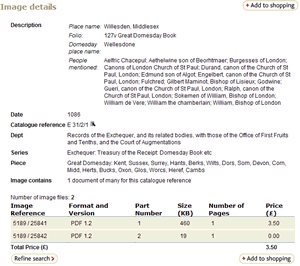 You might think that there’s a little difficulty in using it, as many of the surnames used by people and names of areas have changed substantially over the last thousand-odd years. Luckily they thought of that one. Simply enter the modern name in the Place Name box, if you’re a boffin with knowledge of ye-olde world, you enter the old name in the Other keywords box.
You might think that there’s a little difficulty in using it, as many of the surnames used by people and names of areas have changed substantially over the last thousand-odd years. Luckily they thought of that one. Simply enter the modern name in the Place Name box, if you’re a boffin with knowledge of ye-olde world, you enter the old name in the Other keywords box.
We don’t want to cast a shadow over this notable event, but we wonder if it’s right that UK residents, who already fund the National Archives through their taxes, should pay the same amount to access the info as those from abroad.
 There’s a couple of theories as to why it’s called the Domesday or Doomsday Book (depending on your preferenece) – Biblical Day of Judgement or when some bloke called Christ will return to judge the living and the dead. Neither of them particularly jolly.
There’s a couple of theories as to why it’s called the Domesday or Doomsday Book (depending on your preferenece) – Biblical Day of Judgement or when some bloke called Christ will return to judge the living and the dead. Neither of them particularly jolly.
Those long in the tooth will remember the BBC launch the BBC Domesday Project, to put the book on the 12-inch laserdisc. Sadly, these days, this project is remembered as an example of information lost to an old format that cannot be retrieved.
Get going and research your family or local area at the National Archive Web site at domesday Book
 Vodafone is hotly denying that its enthusiasm for 3G has waned, after rumours began circulating that the operator was cutting handset subsidies and abandoned all hope of the technology ever becoming a lucrative commercial success.
Vodafone is hotly denying that its enthusiasm for 3G has waned, after rumours began circulating that the operator was cutting handset subsidies and abandoned all hope of the technology ever becoming a lucrative commercial success. Video calling
Video calling Not surprisingly, the UK’s only 3G-only network, 3, were quick to quibble about the claims, insisting that the wild popularity of their downloadable music and mobile TV services is proof positive that the demand is there – if the technology is marketed correctly.
Not surprisingly, the UK’s only 3G-only network, 3, were quick to quibble about the claims, insisting that the wild popularity of their downloadable music and mobile TV services is proof positive that the demand is there – if the technology is marketed correctly. We can always rely on Brando to come up with quirky, bizarre and sometimes near-scary products, so we thought we’d take a look at their latest range of USB speakers.
We can always rely on Brando to come up with quirky, bizarre and sometimes near-scary products, so we thought we’d take a look at their latest range of USB speakers. Mouse speakers
Mouse speakers Where did you get those ears from?
Where did you get those ears from? Apple sounds
Apple sounds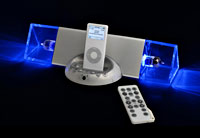 Prestige-hunting iPod owners keen to get one up on their mates need look no further than this rather remarkable iBlueTube valve amplifier, available from Japanese tech company, Thanko.
Prestige-hunting iPod owners keen to get one up on their mates need look no further than this rather remarkable iBlueTube valve amplifier, available from Japanese tech company, Thanko.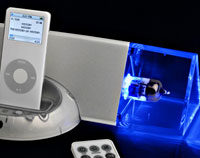 The iPod docks in the centre of the mains powered unit, with the power being supplied via a disappointimgly dull looking, hefty black external power block.
The iPod docks in the centre of the mains powered unit, with the power being supplied via a disappointimgly dull looking, hefty black external power block.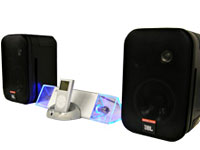 The 295×130×68mm valve amp pumps out a modest 2 x 12W output, with a frequency range of 20Hz – 30Khz (+0dB -3dB), and a claimed 80dB signal-to-noise ratio.
The 295×130×68mm valve amp pumps out a modest 2 x 12W output, with a frequency range of 20Hz – 30Khz (+0dB -3dB), and a claimed 80dB signal-to-noise ratio.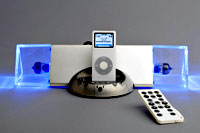 As many a beard stroking hi-fi hugger will tell you, you’ll only get real hi-fi when you’re using the best source components available, and we certainly wouldn’t put an iPod up there with Linn Sondek turntables and Cyrus CD players.
As many a beard stroking hi-fi hugger will tell you, you’ll only get real hi-fi when you’re using the best source components available, and we certainly wouldn’t put an iPod up there with Linn Sondek turntables and Cyrus CD players. UK ISP PlusNet has issued an official ‘sorry’ after having lost 700Gb of their subscribers email and not succeeding recovered it.
UK ISP PlusNet has issued an official ‘sorry’ after having lost 700Gb of their subscribers email and not succeeding recovered it. To put this in perspective, the flow of email for any ISP is considerable with PlusNet getting 1.5 million ’email writes’ a day. They estimate that 700Gb of email takes about 3 days to build up. With this flow of data backing up to tape simply isn’t practical.
To put this in perspective, the flow of email for any ISP is considerable with PlusNet getting 1.5 million ’email writes’ a day. They estimate that 700Gb of email takes about 3 days to build up. With this flow of data backing up to tape simply isn’t practical. It’s amazing to watch the price reduction of consumer goods. First we saw the free fall of the VHS machines, then DVD players which got to the ridiculous level of £19.99 – with 10 DVD’s.
It’s amazing to watch the price reduction of consumer goods. First we saw the free fall of the VHS machines, then DVD players which got to the ridiculous level of £19.99 – with 10 DVD’s.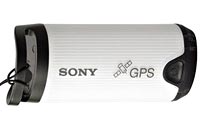 Sony Electronics have announced a groovy new GPS device that lets you add time and location information to pictures and movies captured with their digital still cameras or camcorders.
Sony Electronics have announced a groovy new GPS device that lets you add time and location information to pictures and movies captured with their digital still cameras or camcorders. Armed with this info, users can fire up the new Picture Motion Browser software that comes with the latest Sony cameras and camcorders, and see their photo locations as push pins on an online mapping website, powered by Google Maps (we’ve no idea if this software will also be made available to non Sony users.)
Armed with this info, users can fire up the new Picture Motion Browser software that comes with the latest Sony cameras and camcorders, and see their photo locations as push pins on an online mapping website, powered by Google Maps (we’ve no idea if this software will also be made available to non Sony users.) UK banks may be gleefully reporting big fat profits every quarter, but new research from eService provider Transversal claims that online customer service from Britain’s banks has sunk to an all time low.
UK banks may be gleefully reporting big fat profits every quarter, but new research from eService provider Transversal claims that online customer service from Britain’s banks has sunk to an all time low. Of the forty per cent that bothered to provide an email address, there was clearly no rush to answer their customers’ questions, with the banks taking a leisurely average of 22 hours to respond.
Of the forty per cent that bothered to provide an email address, there was clearly no rush to answer their customers’ questions, with the banks taking a leisurely average of 22 hours to respond.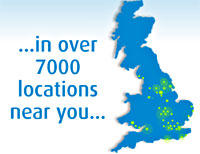 UK regulator Ofcom is looking at plans to introduce high speed Internet access to broadband-starved remote areas by boosting the power of Wi-Fi signals.
UK regulator Ofcom is looking at plans to introduce high speed Internet access to broadband-starved remote areas by boosting the power of Wi-Fi signals. City networks
City networks Ruckus, who are currently working with Google to test a free mesh network in Mountain View, California, have developed a new Wi-Fi antenna to help home users connect to city networks.
Ruckus, who are currently working with Google to test a free mesh network in Mountain View, California, have developed a new Wi-Fi antenna to help home users connect to city networks. As of today BT is reshuffling its phone pricing structure. In a typical move of a power-crazed ex-monopoly, it’s giving with one hand and taking away with another.
As of today BT is reshuffling its phone pricing structure. In a typical move of a power-crazed ex-monopoly, it’s giving with one hand and taking away with another.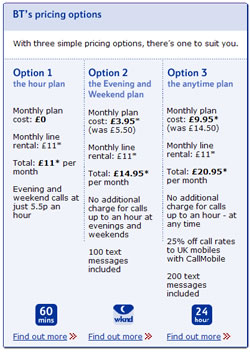 The ‘taking’
The ‘taking’